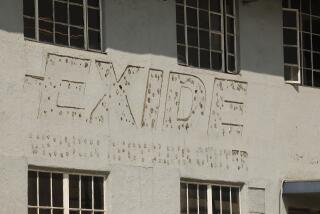Oil spill waste raises concerns in the gulf
Even though BPâs busted well has stopped spewing oil, the disaster is still generating tons of soiled boom and other oily waste that federal and state laws allow to be buried at specially designated dumps, some near residential neighborhoods.
Officials in one Mississippi area, however, raised concerns about the magnitude and safety of the oil spill waste being buried nearby. On Thursday, Harrison County officials blocked it from being dumped in their community â potentially opening the door for others in the region to do the same.
County supervisors voted in June to stop BP from dumping waste at subcontractor Waste Management Inc.âs Pecan Grove landfill in Pass Christian, Miss. When Waste Management balked, the county board commissioned independent testing of the waste and subpoenaed the companyâs test results that reportedly showed it was not hazardous.
But rather than prolong the dispute, BP and Waste Management decided to stop dumping at Pecan Grove. The county, however, has continued with its waste testing and results are pending, said Tim Holleman, the county boardâs attorney.
âUltimately, I think people will raise the same issue elsewhere,â Holleman said.
A BP spokesman confirmed the agreement but defended the companyâs waste management plan.
âThis is industrial waste, and itâs suitable for industrial landfills,â said BP spokesman Mark Proegler. âIf the localities have concerns about that, weâre certainly willing to talk with them.â
Spill waste is hauled from beaches and the ocean to more than 50 regional storage sites in all four gulf states, where it is packaged for shipment to recyclers, liquid waste processors and landfills. So far the spill has generated about 35,600 tons of solid waste.
In Louisiana, the formerly abandoned Grand Isle Shipyard has been transformed into a waste storage site, where about 150 workers pump oil from skimmer boats into storage tanks. More than 7.7 million gallons of oily liquid waste have been collected. At the docks, workers dump plastic bags of oily debris into dozens of dumpsters.
The sprawling operation is indicative of the cleanup industry that has grown out of the nationâs worst oil spill disaster. The now-capped well was spewing as many as 60,000 barrels of oil a day since the April 20 explosion of the Deepwater Horizon oil rig.
âTypically with a spill youâd have a bell-shaped curve where you deploy the boom, recover it and go home,â said Joe Kramer, project manager with BP subcontractor Miller Environmental Services Inc. âItâs more of an ongoing operation here.â
Waste samples are tested at storage sites by BP subcontractors to ensure they are, by law, nonhazardous. Much oil industry waste is not considered hazardous under a 1980 exemption carved out of the federal law.
Oil waste can be dumped in industrial-graded landfills, which are more strictly monitored than municipal dumps but not as isolated or restricted as hazardous waste sites.
âThese are the type of facilities you want this waste to go to,â said Sam Phillips, solid waste permits administrator for the Louisiana Department of Environmental Quality. âIf something goes wrong, there are things we can do to prevent it from getting into a drinking-water aquifer.â
Members of the Gulf Coast congressional delegation said they intended to hold BP accountable for the health and safety of communities where spill waste was dumped.
âGulf Coast residents have a right to be concerned about the waste placed in their landfills, and BP and its agents should do everything they can to work with local officials to address these concerns,â said Sen. Thad Cochran (R-Miss.) after a trip to spill-affected areas this month.
Environmental Protection Agency Administrator Lisa Jackson said tests by BP and her agency had shown that oil spill waste was not hazardous.
âThe constituents of most of it are industrial waste, not hazardous, man-made chemicals, and itâs testing that way,â said Jackson, a chemical engineer by training. To reassure residents, Jackson ordered more EPA testing last month and required BP to release more information about waste testing, tracking and disposal.
But many gulf residents still worry.
âAnything thatâs man-made can fail,â Harrison County Supervisor Marlin Ladner, a Mississippi lawmaker, said of the landfills. âThe rig shows us that.â
More to Read
Sign up for Essential California
The most important California stories and recommendations in your inbox every morning.
You may occasionally receive promotional content from the Los Angeles Times.











